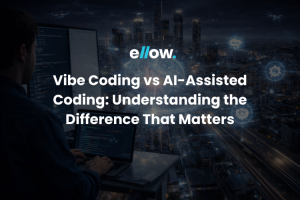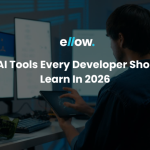Finding and hiring developers isn’t easy anymore. There’s just too much going on — lots of resumes, lots of platforms, but not enough real signals. Some teams are using AI in tech recruitment now, not because it’s perfect, but because doing everything by hand is just too slow.
It’s not a silver bullet. But it helps. AI tools can look at way more candidates, flag ones that match certain skills, and even guess who’s more likely to work out long-term. That doesn’t mean humans are out of the picture — it just means the early part of hiring doesn’t have to suck up so much time.
Especially in tech, where every developer counts, this kind of help is starting to matter more. This article goes into how companies are actually using AI, what works, and where it still kind of struggles.
The Rise of AI in Tech Recruitment
AI in tech recruitment has moved from being optional to almost unavoidable. What used to be experimental is now part of daily hiring operations across the board.
- 88% of companies worldwide have adopted AI in HR tasks, including hiring.
- Among large enterprises, it’s even more widespread — 93% of Fortune 500 CHROs say they’re using AI-driven recruitment tools.
(Source: LinkedIn Talent Blog) - The message is clear: AI isn’t just a trend anymore — it’s a key part of how modern hiring gets done.
So, why the sharp rise in AI in tech recruitment? A few real-world reasons:
- Massive hiring data volumes — recruiters now deal with thousands of resumes, GitHub profiles, and LinkedIn pages. AI helps sift through it all quickly.
- Smarter tools — today’s AI systems don’t just match keywords; they evaluate experience, scan for relevant skills, and even hold candidate conversations via natural language processing.
- Hiring pressure is real — companies need the right developers fast, especially in tech where competition is intense.
- A recent survey found that 60% of organizations already use AI for tasks like recruitment and employee development.
AI-Powered Sourcing: Reaching Beyond the Usual Talent Pool
Finding the right developers isn’t just about scrolling through resumes anymore. With AI in tech recruitment, tools now do the digging — scanning job boards, GitHub, and other platforms to spot people who fit.
- Helps spot remote or hard-to-find talent faster
- Can even flag passive candidates who aren’t actively applying
- Saves hours recruiters would spend manually searching
Instead of guessing who might be a fit, AI filters based on skills, languages, and past work — and does it in minutes.
Faster, Smarter Screening with AI
AI in tech recruitment helps speed up screening by handling the repetitive parts — going through resumes, picking up relevant skills, and flagging strong matches. It doesn’t just look for keywords but can also understand context from project summaries or past work.
For coding roles, AI tools now assess test results and even review how candidates approach problems. Video interviews can also be analyzed for basic communication and logic. While final decisions still rest with people, AI helps reduce time-to-hire and ensures good candidates don’t slip through because of delays or missed details.
AI Cuts Costs Without Cutting Corners
One big reason tech teams are turning to AI in tech recruitment is that it saves money. A lot of it. Hiring used to take weeks — sorting resumes, calling people, setting up tests. AI now handles much of that. It screens faster, finds better fits, and cuts out a bunch of the guesswork.
It’s not just about speed. Fewer bad hires, less money wasted on job ads or third-party recruiters. Hirebee says companies using AI tools have cut hiring costs by up to 30%.
Also, one recruiter can now manage more roles without burning out. And when AI shows which sources actually bring solid candidates, teams can stop spending on what doesn’t work.
At the end of the day, it’s simple: better tools, fewer mistakes, and more budget left over.
Better Hires, Less Turnover
Speed matters, but getting the right developer is what really counts. That’s where AI in tech recruitment helps — it doesn’t just match skills, but also looks at traits, past performance, and even fit with team dynamics.
Instead of guessing, it uses patterns and past hires to spot who’s likely to stick around. LinkedIn found that 61% of recruiters believe AI improves how they measure quality of hire.
This approach reduces churn, especially in fast-paced tech teams, and helps companies build stronger, more stable dev teams over time.
Making Hiring Fairer with AI
Let’s be honest — bias shows up in hiring, even when no one means for it to. That’s where AI in tech recruitment can help. It doesn’t care where someone’s from or what their name is. It’s focused on skills. What they’ve done. The stuff that actually matters.
There’s proof it works. One study from Harvard Business Review said AI hiring led to a 20% jump in diversity.
Now, it’s not perfect. If the data it learns from is flawed, it’ll mess up. That’s on us to fix. Still, when used right, it makes the process more fair. You end up seeing great people you might’ve missed — and that alone makes it worth using.
What AI Feels Like to the Candidate
We talk a lot about how AI in tech recruitment helps companies, but it changes things for candidates too — usually in a good way. Developers now deal with AI throughout the process, whether it’s a chatbot replying fast or an automated tool scheduling interviews.
These small touches make things smoother. No back-and-forth on calendar slots. No guessing if your resume was even seen. Just clearer updates, quicker feedback.
And most people don’t seem to mind. One report said 62% of job seekers are okay talking to AI during hiring.
(Source: Hirebee)
If it’s done right, candidates feel taken care of — even before a real person talks to them.
Where AI Has Limits — And Why People Still Matter
AI in tech recruitment can do a lot. It sorts, filters, speeds things up — no argument there. But it’s not without issues, and relying on it too much can create new problems instead of solving old ones.
A few things to watch out for:
- Bias isn’t always removed — if the training data is flawed, AI just learns the same habits
- Unconventional candidates may get missed — not everyone has a textbook career path
- The process can feel robotic — when there’s no human touch, candidates notice
- Data privacy — candidates want to know how their information is being used
That said, most people are okay with AI being part of the process — as long as there’s a human involved. In fact, 75% of job seekers said that’s their preference.
The Future of AI in Tech Recruitment
AI in tech recruitment is quickly moving beyond just tools for efficiency — it’s becoming the backbone of the hiring process. We’re heading toward a future where much of recruitment, especially the early stages, could run with minimal human input. Generative AI is already being used to draft job descriptions, screen profiles, and personalize outreach. Predictive models will likely improve too — identifying upcoming hiring needs and surfacing candidates before a job is even posted. According to Gartner, 30% of corporate hires may soon be made via AI platforms, with little human input during sourcing and initial screening.
(Source: LinkedIn)
But this doesn’t mean recruiters become irrelevant — their role is simply evolving. With AI covering the routine tasks, hiring professionals can shift focus to:
- Employer branding
- Candidate relationship-building
- Interviewing and final decision-making
- Ensuring successful onboarding and retention
Recruiting is becoming more strategic than administrative. For companies, especially those hiring remote developers, using AI smartly can mean faster growth, broader reach, and better teams — built at scale, without cutting corners.
The Road Ahead
Let’s face it — AI isn’t just a tool anymore. It’s changing the way developers get hired. Things that used to take days now take minutes. With AI in tech recruitment, teams aren’t stuck doing the same old admin work. They can actually focus on stuff that matters — like figuring out if someone’s a real fit, having honest conversations, and moving faster without cutting corners. And while AI will keep evolving, the companies that use it well and keep people in the loop? They’re the ones who’ll end up with better, stronger dev teams.







